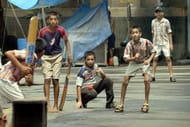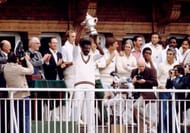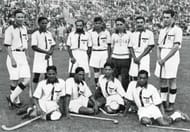Indian fans and supporters still get goosebumps when they relive that epic moment Kapil Dev & his devils won the 1983 Prudential World Cup. 33 years down the line, the victory is still the most historic achievement by any Indian cricket team.
In a tournament where no one really thought that India would even qualify for the semifinals, they defeated the dominant West Indies twice in the tournament to become the World Champions.
It was the captain who led from the front – his 175 against Zimbabwe at Tunbridge Wells is regarded as one of the greatest ODI innings ever played. The innings was invaluable as it came when India was tottering at 17/5.
A defeat would have meant the end of the road for India in the tournament, but the skipper kept their hopes alive, and the rest is history. Unfortunately, the British Broadcasting Corporation (BBC) had a strike on that day and we don’t have the footage of his brilliant innings.
Playing against a star-studded West Indies in the final, India could only manage 183 after batting first and it looked like West Indies would go on to win the World Cup for the third consecutive time. But what transpired next is now etched in every Indian cricket lover’s mind.
As Indian cricket fans we feel really proud of that moment, but did you ever imagine what would have been the situation of Indian cricket if we hadn’t won that tournament?
The 1983 World Cup popularized the game in the country immensely and it gave cricket a huge lift among the fans. Youngsters started taking up the sport and dreams of representing their country in the future started taking shape. Big coaching academies mushroomed up everywhere to develop the young budding cricketers. The whole scenario of the sport in the country changed forever.
Without the World Cup success in India, things would have been very different, to put it mildly.
Now let us assume for a few minutes that India had failed to win the 1983 World Cup. What would have been the situation of cricket in the country 33 years down the line?
#1 Cricket in India would not be the dominant sport

The World Cup victory in 1983 proved to be critical in popularizing the sport in the country. Youngsters started taking up cricket seriously and wanted to make it a profession. Many coaching academies started to develop across the country where youngsters could get proper training to realize their dream.
The World Cup victory made the Indian team believe in their abilities as an ODI team. Kapil changed the mentality of the players and from a weak ODI team they became a real force to reckon with. Within a couple of years, they went on to win the Benson and Hedges World Championship under the captaincy of Sunil Gavaskar.
The World Cup win paved the way for much more success in the future years. More than three decades down the line, the memory of 25th June 1983 is still fresh in every Indian cricket lover’s mind.
#2 India wouldn’t have hosted the 1987 Reliance World Cup

Without India’s success in the 1983 World Cup, it would have been highly unlikely that they would have hosted the 1987 Reliance World Cup. The first three editions of the competition were held in England and it was India’s success that changed the mindset of ICC's administrators; they decided to make India the hosts for the next edition to accommodate the growing popularity of the game in the subcontinent. India and Pakistan were ultimately named the joint hosts for the tournament.
It was one of the most closely fought World Cups, and the stadiums in both India and Pakistan were jam-packed.
The competition, for the first time, was won by Australia as they defeated their arch-rivals England in the most evenly fought contest in a World Cup final till date. India and Pakistan both failed to reach the finals as they were eliminated in the semi-finals.
West Indies, on the other hand, failed to make a mark in the tournament and did not proceed beyond the group stage.
#3 Sachin Tendulkar might not have taken up cricket
When India won the 1983 World Cup, Sachin Tendulkar was a 10-year-old kid. The victory made a big impact on the future “Little Master”. Though Tendulkar was born to play cricket, India’s success in the 1983 World Cup instilled the self-belief in him and the dream to win a World Cup for his country.
In an advertisement prior to the 2011 World Cup, Sachin Tendulkar was seen saying that he was just 10 years old when he saw what it meant to play and win a World Cup.
Sachin’s brother, Ajit Tendulkar, took him to Ramakant Achrekar when he was 11 – and the rest is history.
At 15, Sachin notched up a record partnership with his friend Vinod Kambli playing for his school Shradhyashram Vidyamandir. At 16, he was drafted into the Indian senior squad and for the next 24 years the little champion from Mumbai went on to break every possible batting record. Moreover, his record of 100 international hundreds is unlikely to be broken by any batsman anytime soon.
Without the World Cup win in 1983, we could have been deprived of seeing arguably the greatest batsman of all time.
#4 Clive Lloyd would have been the first and only captain till date to win three consecutive World Cups
West Indies won the World Cup in 1975 and 1979 and were undoubtedly the most dominant side in world cricket during that phase. The all-conquering West Indies team was studded with superstars both in the batting and bowling department.
They came into the 1983 World Cup as firm favourites but were shocked by India in their first group encounter. The defending champions came back very strongly and won all the other group games to qualify for the semi-finals. They steamrolled Pakistan at that stage to set up a final clash with India after the latter defeated England in the semi-finals.
West Indies restricted India to 183 and when Viv Richards was firing all cylinders, it looked as if they would clinch the World Cup for the third consecutive time. But an inspired no-look running catch by Kapil Dev changed the whole complexion of the match.
After Richards’ dismissal, West Indies started losing wickets at regular intervals. Eventually, they were bowled out for 140, handing India their first ever World Cup win. A victory for West Indies would have made Clive Llyod the one and only captain till date to win three consecutive World Cups.
#5 Hockey would have been India’s No. 1 sport
Hockey was the most popular sport in India from its early days, with the national team being the undisputed champions of the sport – winning eight gold medals in the Summer Olympics between 1928 and 1980. Their domination was the main reason behind the sport being the most popular in the country.
The World Cup win for the Indian cricket team in 1983 and a string of poor performances by the hockey team around that time were instrumental in cricket becoming popular and hockey fading away. The Indian hockey team failed miserably for the next few years and it was only at the 2016 Olympics, that they qualified for the knockout stages after 36 years.
Had India not won the World cup, it is highly unlikely that hockey would have faded away into oblivion and paved the way for cricket to become the numero uno sport in the country.
Follow IPL Auction 2025 Live Updates, News & Biddings at Sportskeeda. Get the fastest updates on Mega-Auction and cricket news


